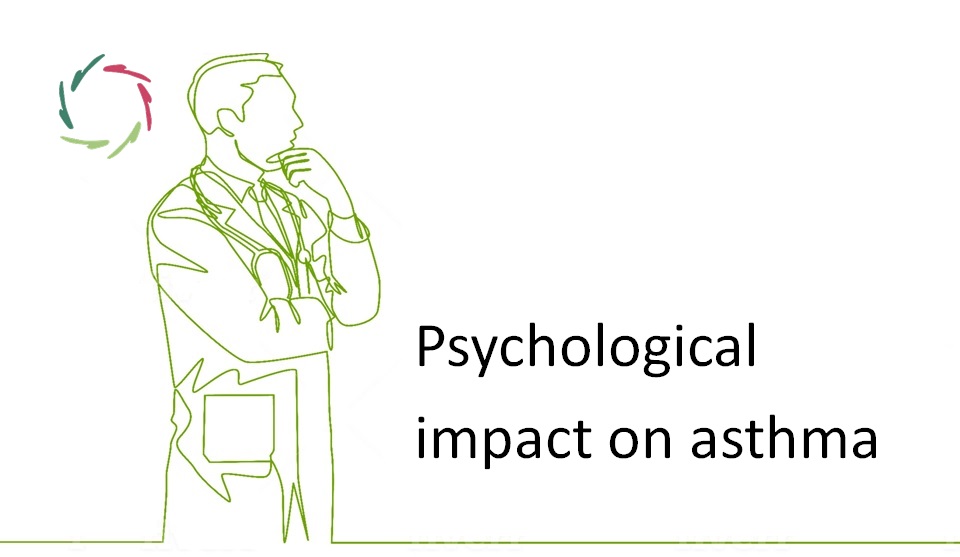Psychological impact on asthma

Asthma is among the most prevalent chronic diseases; in children, it now leads the chronic disease statistics. In the United States, it affects an estimated 10.6 million (14.5%) children [U.S. Department of Health, 2014]. There are an estimated 300 million asthmatics worldwide [Masoli et al., 2004].
Stress and infections have long been independently associated with asthma pathogenesis and exacerbation. Psychological stress was first recognized as a potential immune system modulator of asthma, being referred to as a ‘neurotic affection,’ at the end of the 19th century [Ohno, 2017]. In 1953, the famous psychologist B.F. Skinner had a deep insight into the close relationship between the psyche and the evocation of an asthma attack: ‘An asthmatic attack is not the result of fear, but is part of it. There is no mental condition causing physical symptoms. There is only one complex condition from which the concept of “fear” can be abstracted.’ [Skinner, 1953]
As our understanding of the pathophysiology of airway inflammation and bronchial hyperresponsiveness started to evolve in the 1960s, the psychological theory of asthma was largely set aside by the biomedical community which increasingly recognized asthma as a physical condition related to genetics and disrupted immunity. Advances in psychoneuroimmunology swung the pendulum once again and led scientists to reconsider the role of psychological stress in asthma pathogenesis, including the onset of disease [Wright et al., 1998]. Nowadays, mental stress is increasingly recognized as a key factor in the exacerbation of allergic asthma, whereby brain responses to stress act as immunomodulators for asthma
In a study by C. Butler and A. Steptoe on adults who suffered from relatively stable asthma, the inhalation of a neutral product combined with the suggestion that it would close the bronchial tubes brought about asthmatic symptoms and even induced a blatant attack of asthma [Butler et al., 1986]. The lung function was always checked, showing as objective results as possible. In itself, this can seem a surprising conclusion, but the real amazement came afterward. It turned out that the asthmatic symptoms no longer occurred when the same subjects first received an inhalation with the same product, only this time combined with the suggestion that it was a potent medication for asthma! It was also evident that the subjects’ reactions in this study were not caused by stress. The only variable that could be responsible for the effects in this study was (auto-)suggestion. No magic.
In Japan, Koyanagi and colleagues surveyed factors contributing to asthma exacerbation in 3085 adult patients, reporting that emotional stress caused 10-15% of the asthma exacerbation. In their study, the percentage of patients who had asthma exacerbation caused by psychological stress were gradually increased dependent on asthma severity [Koyanagi et al., 2009].
Studies indicated that exposure to active stressors (e.g., arithmetic tasks) was associated with an increase in sympathetic nervous system (SNS) responses, cortisol, and inflammatory responses, but had little effect on the caliber of the bronchi. Exposure to passive stressors (e.g., watching stressful movies or pictures) was also associated with an increase in SNS responses and with bronchoconstriction [Plourde et al., 2017].
Chronic exposure to high levels of psychosocial stress has been shown to increase the risk of attacks in children with chronic asthma [Sandberg et al., 2000]. Furthermore, exposure to stress in both children and adults has been found to correlate strongly with poor prognoses for asthma [Di Marco et al., 2011].
The central and peripheral nervous systems play an important role in the relationship between emotions and asthma. Psychological stress leads to eosinophilic airway inflammation through activation of the hypothalamic-pituitary-adrenal pathway and the autonomic nervous system. This is followed by the secretion of stress hormones. There is extensive evidence that stress hormones, including glucocorticoids, epinephrine, and norepinephrine, which are secreted following CNS activation, can alter immune processes, induce inflammation, and increase susceptibility to infection [Calcagni et al., 2006]. The immune system has many different components that are susceptible by psychological stress. In asthma specifically, Th cells can become dysregulated.
Recent systematic reviews and meta-analyses, including prospective epidemiological studies, substantiate a significant effect of prenatal stress and stress in early childhood on the development of asthma and other atopic-related disorders (eczema and allergic rhinitis), with many studies showing an exposure-response relationship [Rosa et al., 2018].
Respiratory infections have long been associated with asthma pathogenesis and exacerbations [Sakellariou et al., 2008]. Research indicates that psychosocial stress is associated with increased susceptibility to infection and asthma exacerbation. Consequently, it is plausible that psychological stress may impact allergy and asthma symptoms directly by modulating immune processes and indirectly by increasing vulnerability to respiratory infections [Wright et al., 1998]. If so, psychological factors would expand their influence on asthma to one of the most common triggers of asthma exacerbations.
Despite the availability of effective treatments, over 50% of asthma patients remain poorly controlled [Fitzgerald et al., 2006], accounting for a significant proportion of health care costs [Bahadori et al., 2009; Ehteshami-Afshar et al., 2016] [Plourde et al., 2017]. Optimal asthma control depends on several behavioral (e.g., managing environmental triggers, and adherence to controller medication) [Global Initiative for Asthma, 2016] and physiological (e.g., bronchial and immune responses to allergens) [Carr et al., 2015] factors, both of which may be influenced by psychological stress [Plourde et al., 2017]. Additional recent research has explored the use of multidisciplinary, collaborative, integrated care with pediatric asthma patients, providing promising results [Oland et al., 2017].


